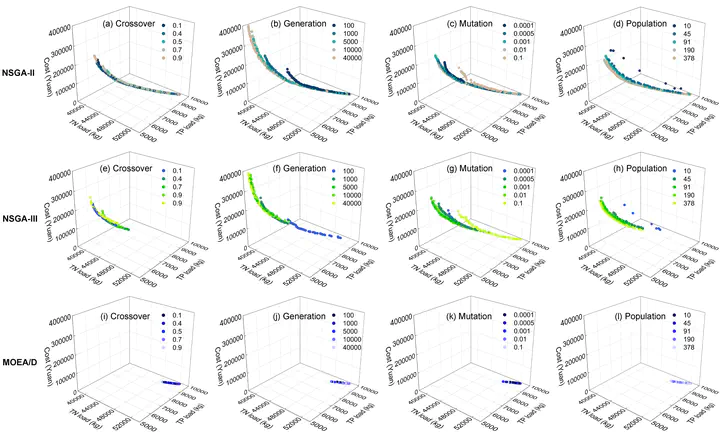Comparison of Multi-Objective Evolutionary Algorithms applied to watershed management problem
 Fig. 6. Visua comparison of solution sets under different parameter settings
Fig. 6. Visua comparison of solution sets under different parameter settings
Abstract
Simulation-based optimization (S-O) frameworks are effective in developing cost-effective watershed management strategies, where optimization algorithms have substantial effect on the quality of strategies. Despite the development and improvement of multi-objective evolutionary algorithms (MOEAs) provide more robust alternatives for optimization, they typically have limited applications in real-world decision contexts. In this study, three advanced MOEAs, including NSGA-II, MOEA/D and NSGA-III, were introduced into the S-O framework and applied to a real-world watershed management problem, and their performance and characteristics were quantified through performance metrics. Results show that a higher crossover or mutation probability do not necessarily promote convergence and diversity of solutions, while a larger generation and population size is helpful for MOEAs to find high-quality solutions. Compared to the other two MOEAs, NSGA-II consistently exhibits robust performance in finding solutions with good convergence and high diversity, and provides more options at the same computational cost, while the degenerate Pareto front of the proposed watershed management problem may account for the poor performance of MOEA/D and NSGA-III in terms of diversity. For a 10% TN or TP reduction target, the average cost of the NSGA-II optimized strategies is 32.22% or 47.83% of the commonly used strategies. In addition, this study also discussed the development of resilient watershed management to buffer the impacts of climate change on aquatic system, the incorporation of fuzzy programming into the S-O framework to develop robust watershed management strategies under uncertainty, and the application of machine learning-based surrogate models to reduce computational cost of the S-O framework. These results can contribute to the understanding of MOEAs and provide useful guidance to decision makers.